A strict production process is necessary to produce top quality wines, from the selection of the best grape varieties down to the bottling stage of the finished wines. Proper preservation of wines is essential to enhancing their taste, flavor and complexity over time. The type of material used for sealing wine bottles is also an important component in creating high quality vintages.
Bottle stoppers provide an airtight seal to bottled wines that allow them to age properly, while stored under optimum conditions in custom wine cellars New Jersey. Wine closures are designed to keep out oxygen from coming into contact with wines. There are five major bottle stoppers used by vintners worldwide: natural cork, screw cap, synthetic cork, vino-lok, and zork.
Cork
Of the 36 billion wine bottles produced each year, about 80% of these bottled wines are sealed using natural cork closures. Cork is an excellent material for wine bottle closures because of its near impermeability to liquids and gases, as well as its high elasticity and compressibility.
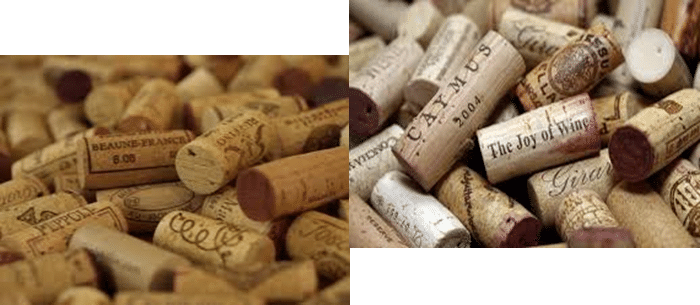
Natural corks are not only effective in sealing wine bottles, but also promote environmentally friendly production practices. The production of cork is considered to be highly sustainable since no cork trees are cut down when harvesting cork. The outer cork bark is carefully extracted by professional harvesters, allowing the tree to continue to live and grow a new layer of cork bark.
The elastic properties of corks allow them to easily compress into wine bottles. Storing bottles in wine cellar racks facilitate continuous cork and wine contact, as this prevents the cork from drying out, as well as allowing it to expand and thus maintain a very tight seal.
Screw Cap
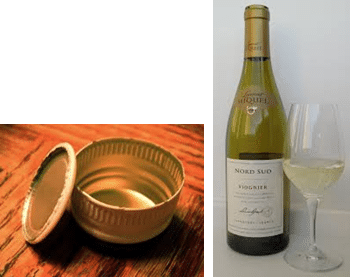
An alternative to traditional natural cork bottle closures is screw caps. This type of wine closure is made of aluminum and plastic. It is designed to engage into the threaded neck of wine bottles. Although screw caps are relatively new to the wine industry, having only been introduced in 1964, these cork alternatives are rapidly becoming the bottle closure of choice for most winemakers, especially in Australia and New Zealand.
Screw caps are gaining in popularity because of the many benefits they provide. For starters, they are one of the most affordable wine closure options. Screw caps create a tighter seal and pose a very low risk of cork taint. In addition, this bottle closure alternative is designed with an easy twist off top for a hassle free opening.
Synthetic Wine Cork
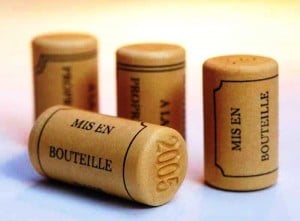
Another economical wine bottle closure is synthetic wine corks. Synthetic or plastic stoppers are designed to function like the traditional cork closure. There are two types of synthetic corks: injection molded and extruded synthetics. Injection molded wine closures are formed through various plastics, such as styrene-butadiene-styrene (SBS) thermoplastic elastomer and styrene-ethylene/butadiene-styrene (SEBS).
Synthetic corks completely eliminate the presence of TCA (2, 4, 6 – trichloroanisole), which causes undesirable odors and offensive tastes in bottled wines. Synthetic wine closures don’t hold moisture, nor do they leak, break, or crumble easily. In addition, they are available in different colors that can add a stylish flair to any custom wine cellars New Jersey.
Vino-Lok
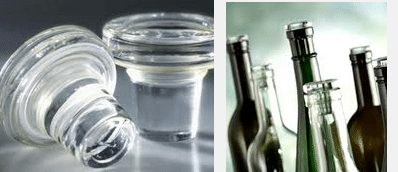
Vino-lok is an alternative bottle closure that is made of glass. Wineries in Germany and Napa Valley have been using this glass stopper since its introduction into the wine making industry in 2003. Vino-lok creates a hermetic seal that maintains the taste and flavor of wines, as well as prevents the occurrence of oxidation. Another benefit of this glass in-bottle closure is that it can be used to reseal the wine bottle.
Zork
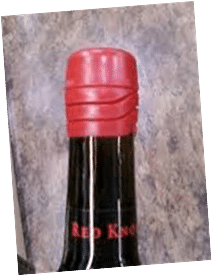
Another wine closure option is Zork, an on-bottle stopper consisting of three parts, including a tough cap material for protection; a foil lining that functions as an oxygen barrier; and a ‘snap on’ application that allows the closure to pop like a cork. Like the Vino-lok, the plastic Zork cap also has the advantage of resealing the bottle and preventing the wine from going flat.
Proper wine storage not only requires a hermetic sealing system, but also a dark and stable environment that will allow wines to improve their taste and flavor for a prolonged period of time. Custom wine cellars New Jersey are carefully designed and constructed in order to provide the right climate conditions for aging and storing wines.
Other Wine Storage Components
Wine cellars are built with proper insulation and vapor barriers that help maintain the desired temperature levels and prevent moisture migration. The installation of a wine cellar cooling system helps regulate temperature and humidity levels inside a wine storage space. The absence of a wine cellar cooling unit will expose wines to fluctuating temperatures that can lead to their spoilage.
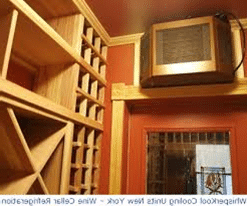
Another component to consider in proper wine storage is wine cellar racks. These storage solutions are designed to provide a space where bottles can rest and age to perfection. Wine cellar racks that support wine bottles in a horizontal orientation are the best storage option, especially for bottles with cork closures, since they allow the cork to remain in contact with the wine. This keeps the cork expanded and the bottle tightly sealed.
When starting a collection of wines for long term cellaring, factors such as the type of wine bottle closure, wine cellar racks, and wine cellar cooling system must be taken into account. These elements are crucial to helping maintain the overall quality of wine collections.
Custom Wine Cellars New Jersey offers wine cellar products and services. Check out some of their racking at Wine Racks New Jersey.

 Call us to receive your custom quote
Call us to receive your custom quote 


